Self-Awareness Training Course
Self-Awareness Course in Singapore
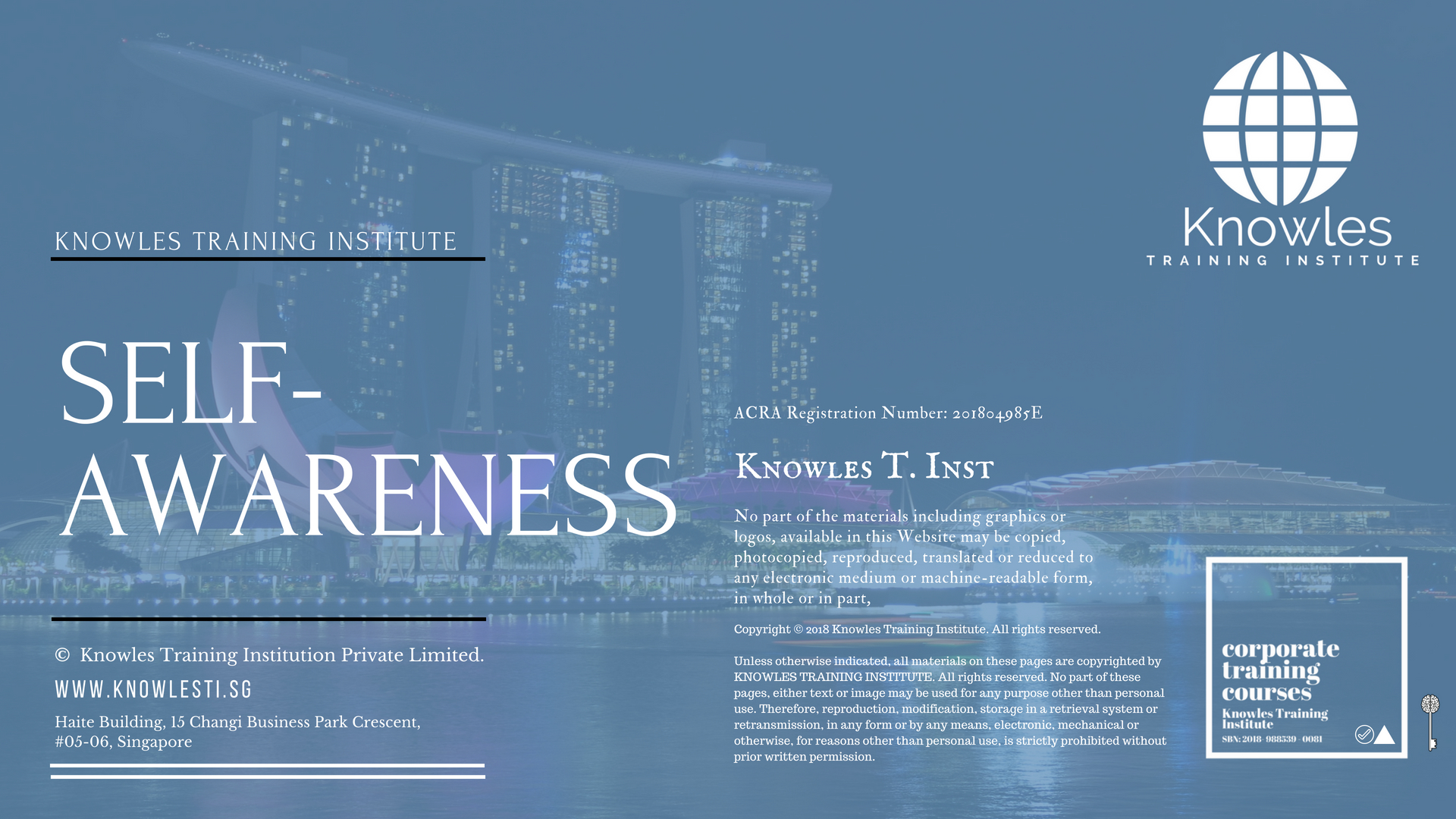
About This Self-Awareness Training Course
Self-Awareness Course in Singapore
Self Awareness is having a clear perception of your personality, including strengths, weaknesses, thoughts, beliefs, motivation, and emotions. Self Awareness allows you to understand other people, how they perceive you, your attitude and your responses to them at the moment.
This is a state of heightened awareness. With practice, we can learn to engage these types of heightened states and see new opportunities for interpretations in our thoughts, emotions, and conversations. Having awareness creates the opportunity to make changes in behaviour and beliefs.
As you develop self-awareness you can make changes in the thoughts and interpretations you make in your mind. Changing the interpretations in your mind allows you to change your emotions. Self-awareness is one of the attributes of Emotional Intelligence and an important factor in achieving success.
This self-awarness workshop is designed to take the first step in creating what you want and mastering your life. Where you focus your attention, your emotions, reactions, personality, and behavior determine where you go in life. Having self-awareness allows you to see where your thoughts and emotions are taking you. It also allows you to take control of your emotions, behavior, and personality so you can make changes you want. Until you are aware in the moment of your thoughts, emotions, words, and behavior, you will have difficulty making changes in the direction of your life.
Self-awareness is often an important skill underlying many other soft skills. Before you can control your interactions with others, you need to first understand your own personal thoughts, feelings, beliefs, and actions. By recognising your own weakness and strangths, how you deal with stress, or how you converse to others, you will be fully able to tailor your responses to the people you are with. You will also be better able to understand your thresholds for stress, thus making you better able to deal with and jump back in the face of challenges. This self-awareness training will teach you the necessary information of self-awareness as well as tangible strategies for creating it within yourself.
Who Should Attend This Self-Awareness Workshop
This Self-Awareness workshop is ideal for anyone who would like to gain a strong grasp and improve their Self-Awareness.
All Staff Within An Organisation
Managers
Team Leaders
Executives
Assistants
Officers
Secretaries
Group Size For This Self-Awareness Training Program
The ideal group size for this Self-Awareness course is:
Minimum: 5 Participants
Maximum: 15 Participants
Course Duration
The duration of this Self-Awareness Workshop is 2 full days. Knowles Training Institute will also be able to contextualised this workshop according to different duration; 3 full days, 1 day, half day, 90 minutes and 60 minutes.
2 Full Days
9 a.m to 5 p.m
Course Benefits
Below is the list of course benefits of our Self-Awareness course
Self-awareness is usually the most considerable skill in carrying many soft skills. Before individuals can manage their interactions with others, they must first understand their thoughts, beliefs, feelings, and actions. By recognising their strengths and weaknesses, how they cope with stress, or how they speak to others, they will be better able to tailor their responses to the people they are with. Individuals will also be better able to understand their thresholds for stress, thus making them better able to cope and spring back in the face of difficulties. This self awareness workshop will teach individuals the important and biology of self-awareness as well as concrete strategies for building it within themselves.
Self-Awareness Training Workshop – Benefits- Part 1
- Your basic understanding of yourself constantly grows deeper, use your self-knowledge as a guide to help you in the choices you make.
- You can be proactive rather than reactive, when you just react to the things that happen to or around you, you can often find yourself in the victim role.
- You don’t need anybody else to tell you your abilities, weaknesses, flaws, and talents—you already know them
- You never let failure go by without learning from it
Self-Awareness Training Workshop – Benefits- Part 2
- When you’re self-aware, you’re never shocked by your own behavior.
- You’re honest about who you are, and you ’re able to really hear what your loved ones say to you, even if their words are critical or full of unasked-for- advice.
- You have a good idea of the steps you need to take in order to accomplish the things you want to achieve.
Self-Awareness Training Workshop – Benefits- Part 3
- The self-aware person knows that it’s important to make peace with those who hurt you but to not give them the power to hurt you again.
- You know and understand your limits and are able to enforce them.
- Being self-aware means living a life based on knowing who you are and being brave enough to share yourself with the world.
Self-Awareness Training Workshop – Benefits- Part 4
- Become more effective
- Improve your skill development
- Become a better leader
Self-Awareness Training Workshop – Benefits- Part 5
- Know your weaknesses and strengths
- Develop decision-making skills
- Get rid of stress and anxiety
- Get motivated to pursue your dreams
Course Objectives
Below is the list of course objectives of our Self-Awareness course
Self-Awareness Course – Part 1
- Know your strengths and weaknesses
Knowing your strengths and coping with your weaknesses, will help you improve self-awareness. Each of us has strengths and weaknesses that compose of who we are and this will help you shape how to reach your goals.
- Ask for feedback and listen
This might not be easy, most especially if you are close-minded and defensive to people who give critiques to you.
- Develop intuitive decision-making skills
Intuition plays a significant role in developing your self-awareness. This can be the source of significant errors in the course of decision making.
Self-Awareness Course – Part 2
- Know your emotional triggers
Identifying what exactly emotionally triggers you can be challenging but getting to know and understanding it, can help you improve yourself.
- Set boundaries
Keeping your boundaries firmly will help you maintain the integrity of your goals and the work you put in it.
- Practice self-discipline
In every area of your life, you need to practice self-discipline. It is a trait that provides you with the enduring focus necessary for you.
Self-Awareness Course – Part 3
- Keep an open mind
One of the most difficult things to practice is to keep an open mind. Understanding someone’s point of view even if you disagree can change and free your mind.
- Try new experiences
Exploring new things will teach you a thing about yourself. This is all about stepping out of your comfort zone and trying to do something you’ve never done before.
- Discover your physical limits
Well, it will teach you, that your limits are not fixed but temporary. Most importantly, it will show you that everything you’re holding back is just in your head.
Self-Awareness Course – Part 4
- Motivate yourself
In addition, awareness of your psychological needs can increase your motivation by helping you understand and seek out the reward that you desire.
- Meditate
Meditation is a practice of improving your moment-by-moment awareness. Meditation usually begins with appreciating of, focusing on, inhaling and exhaling.
Course Content
Below is the list of course content of our Self-Awareness training course
Self-Awareness Course – Part 1
- What is self-awareness?
- How do you become self-aware?
- Identifying your current position by writing out your perceptions in life
Self-Awareness Course – Part 2
- Thinking about your accomplishments that really stand out in your life
- Encouragement of others to be honest with what they feel about you.
- Becoming a Neutral Observer of one’s self
Self-Awareness Course – Part 3
- Practice what patterns of thinking are no longer beneficial to you.
- Values of a self-aware person
- Self-awareness in the workplace
Self-Awareness Course – Part 4
- Self-awareness in relationships
- Self-awareness in the modern world
- How to determine and express difficult emotions in a healthy way such as sadness, anger, and despair
Self-Awareness Course – Part 5
- How to receive and give negative criticism or feedback respectfully
- Listening emphatically to other people’s needs
- How to improve your communication skills when communicating your feelings, thoughts, and needs
Self-Awareness Course – Part 6
- How to make sound decisions and solve problems
- How to regain your normal self after a breakup or loss
- Learn how to identify and get rid of depression, suicidal, and anxiety thoughts
Self-Awareness Course – Part 7
- Learn how to know and understand various influences on your life such as relationships
- Learning effective counselling skills
- Keeping a journal to reflect on feelings, perceptions, behaviours, and choices
Self-Awareness Workshop Value Added Materials
Each participant will receive the following materials for the Self-Awarness course
Self-Awareness Workshop Learner’s Guide
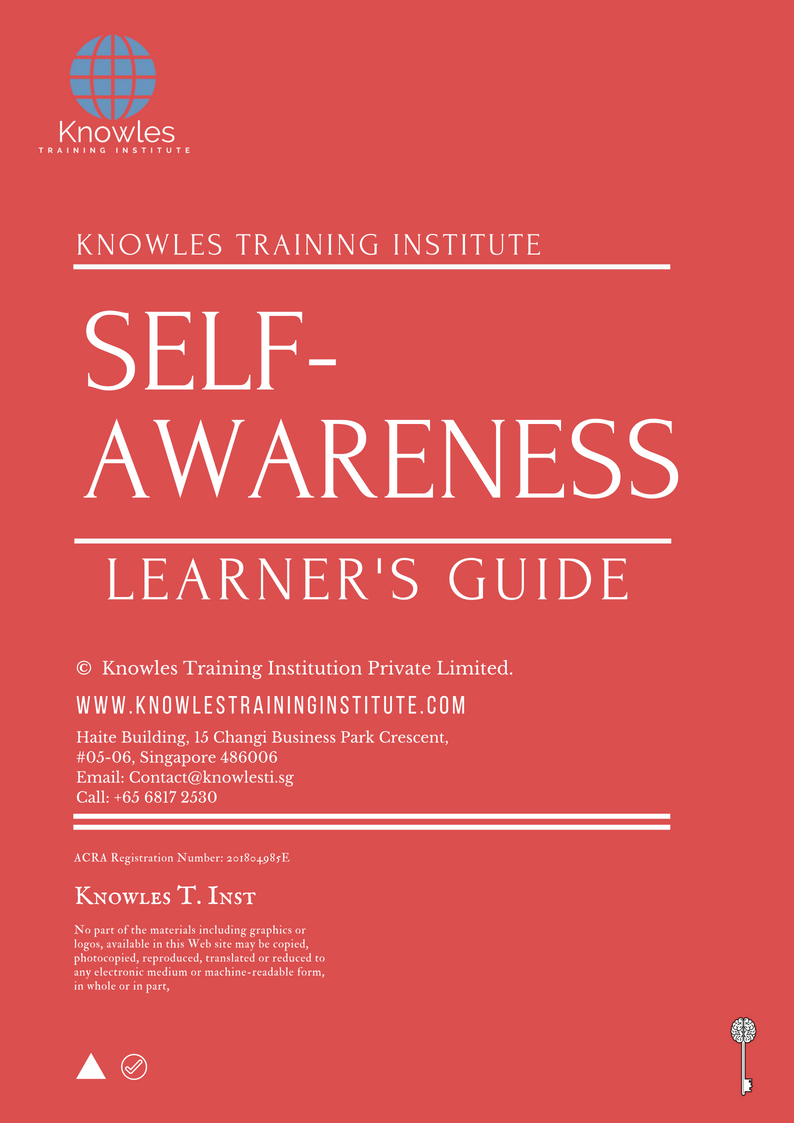
Self-Awareness Workshop Key Takeaways Notes
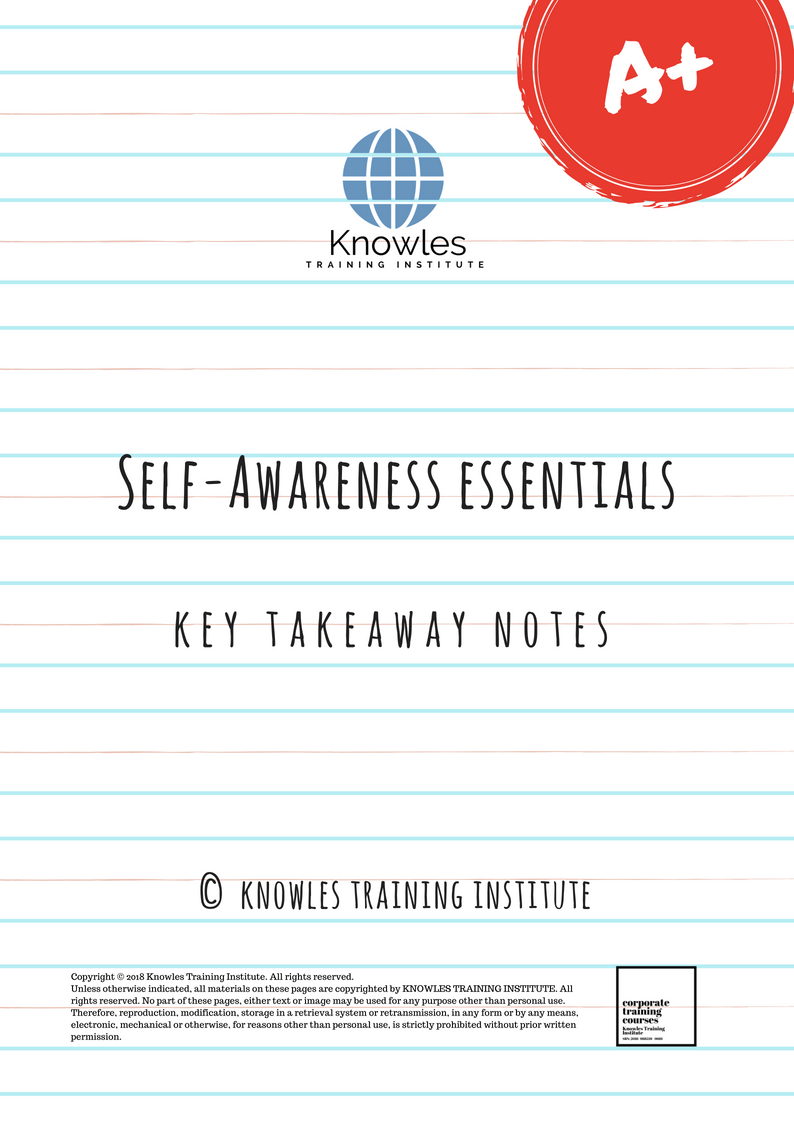
Self-Awareness Training Workshop Essentials Ebook
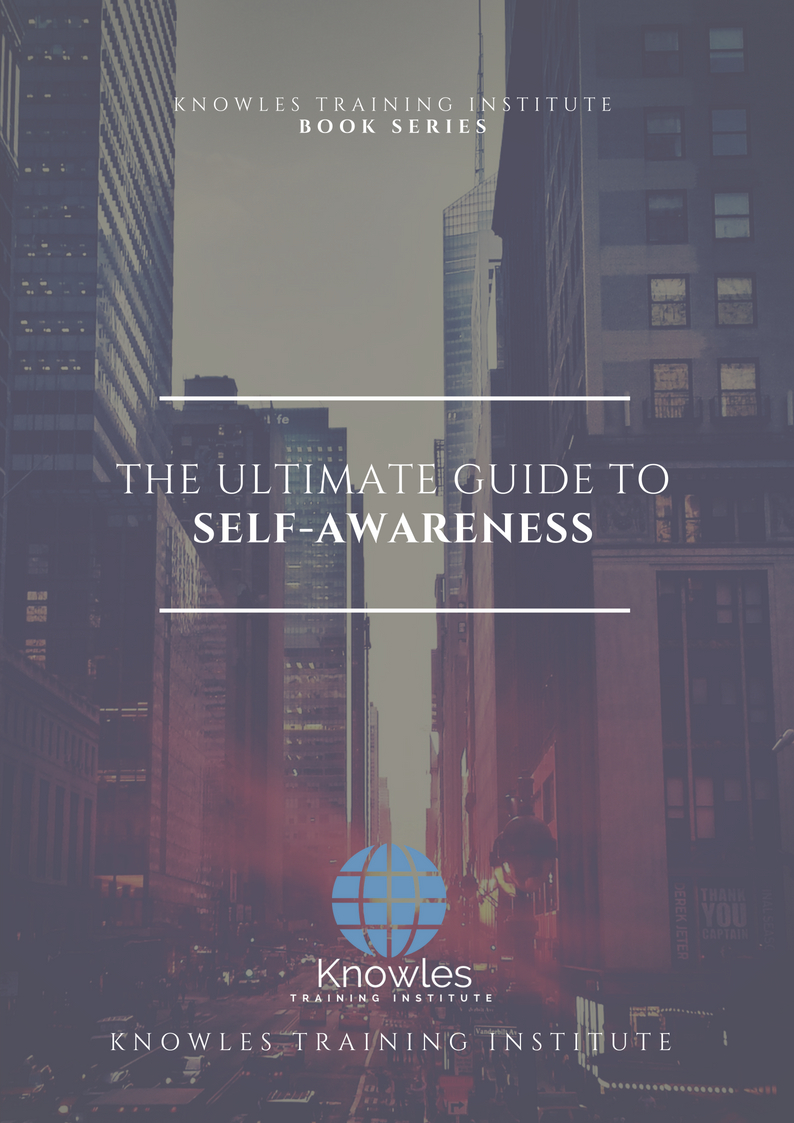
Self-Awareness Training Course Handouts
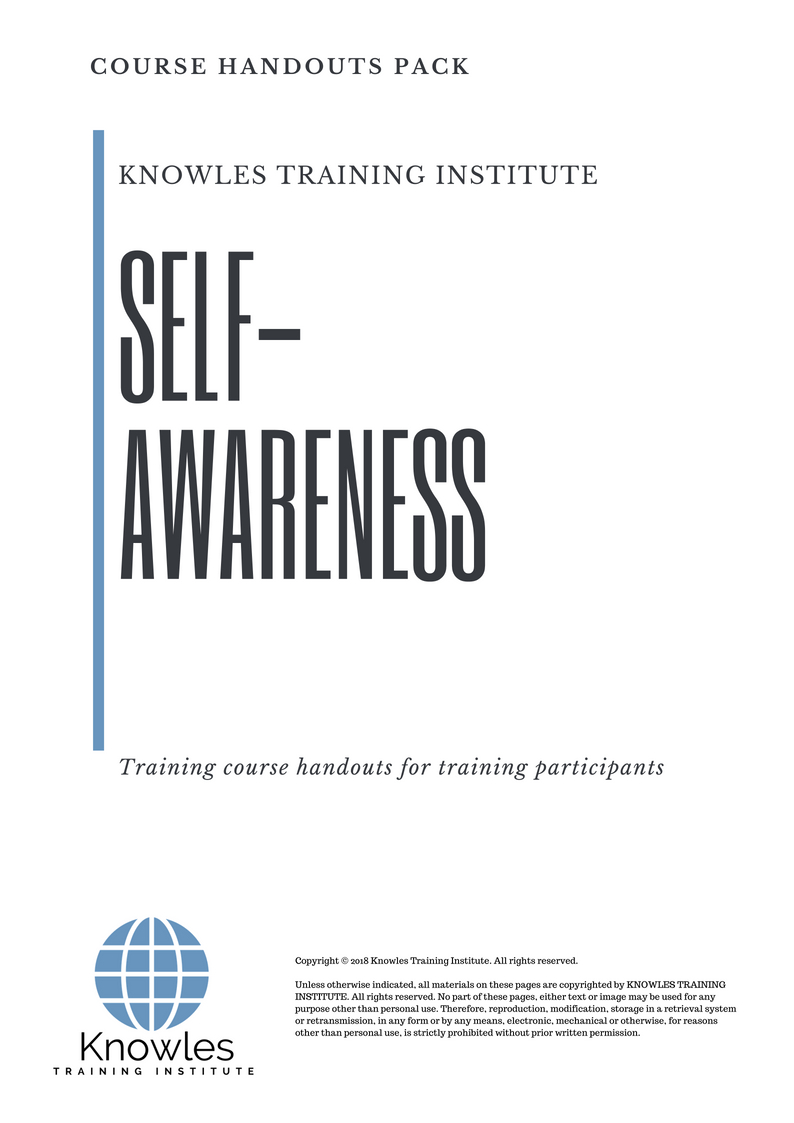
Self-Awareness Workshop 30-Day Action Plan
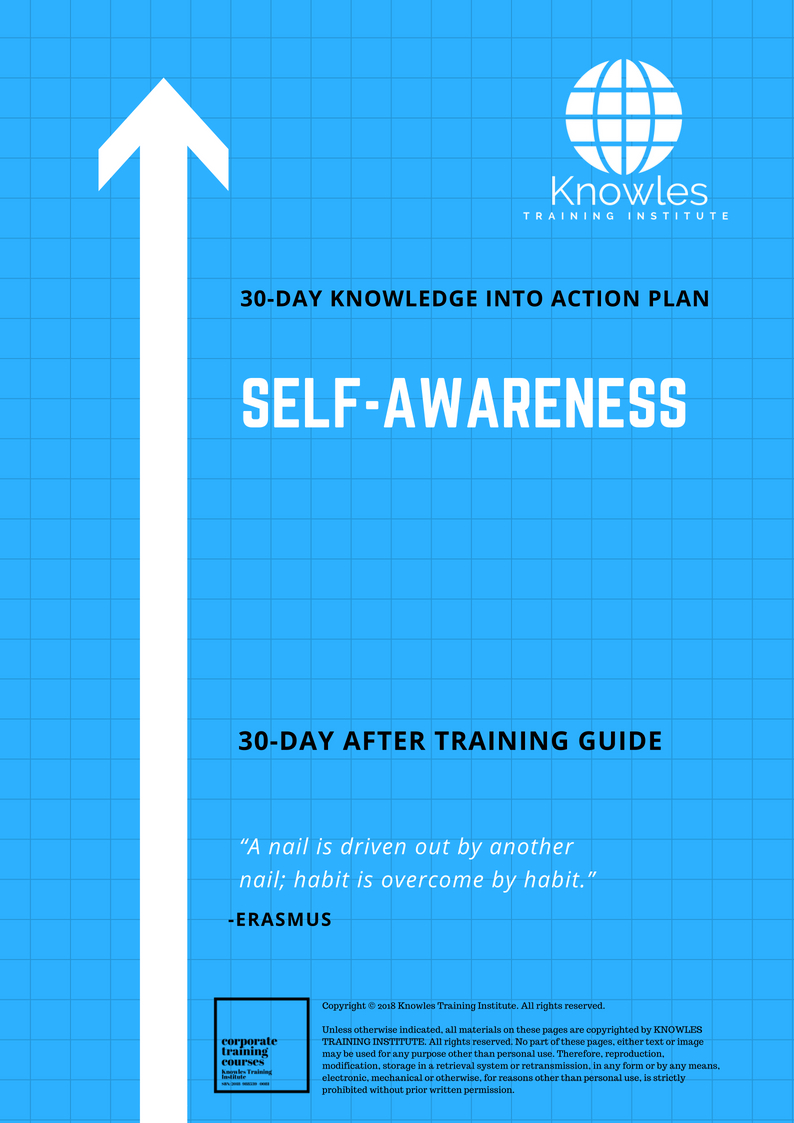
Self-Awareness Workshop MindMaps Pack
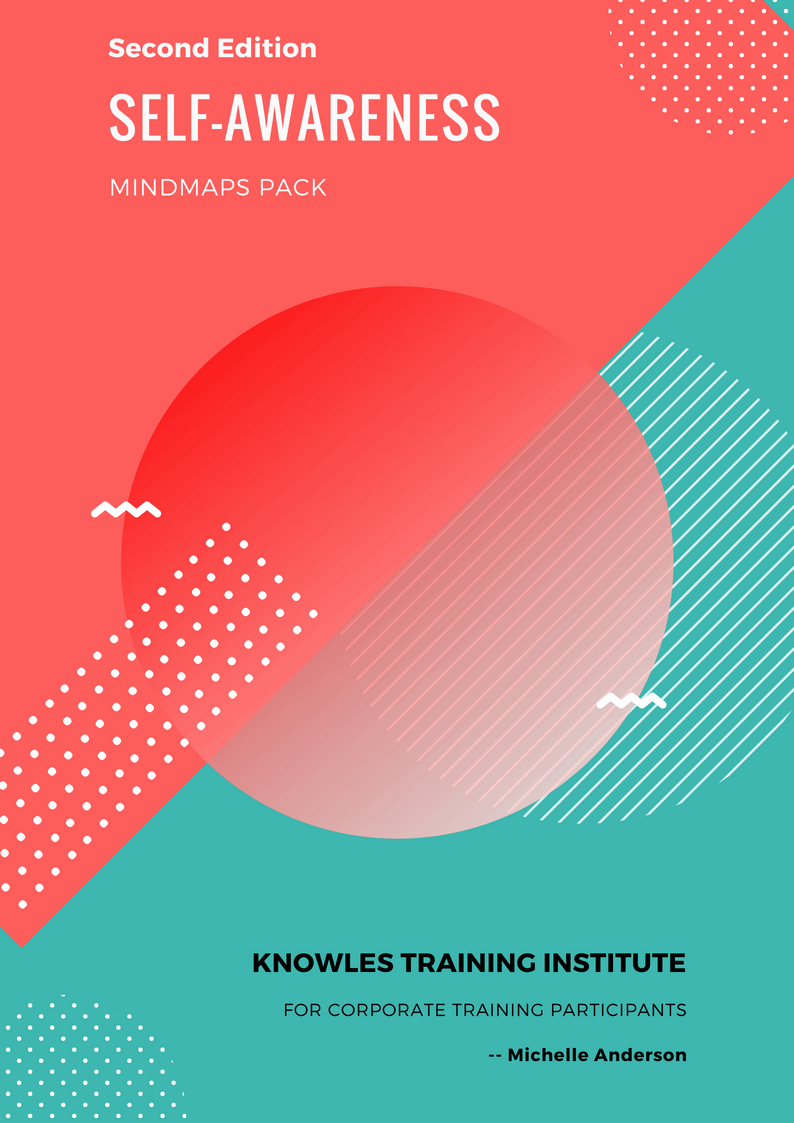
Self-Awareness Training Workshop PPT Slides Used During Course
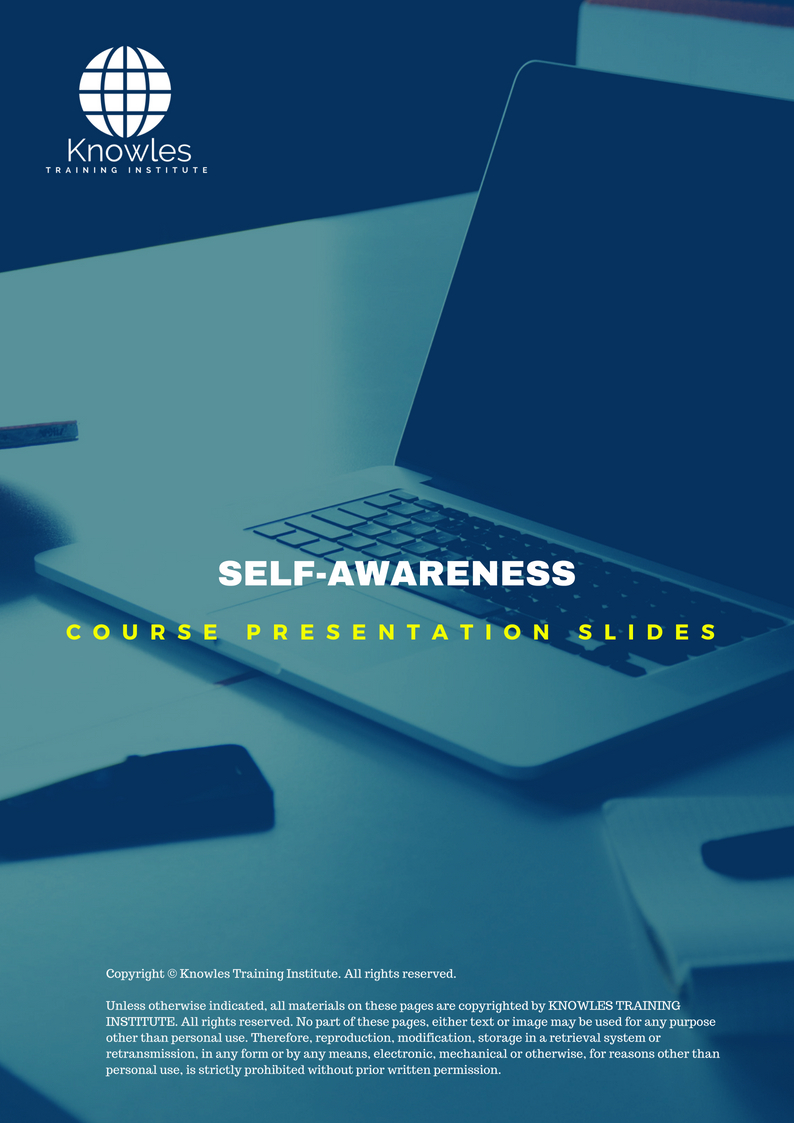
Self-Awareness Training Workshop Long-Term Memory Flashcards Pack
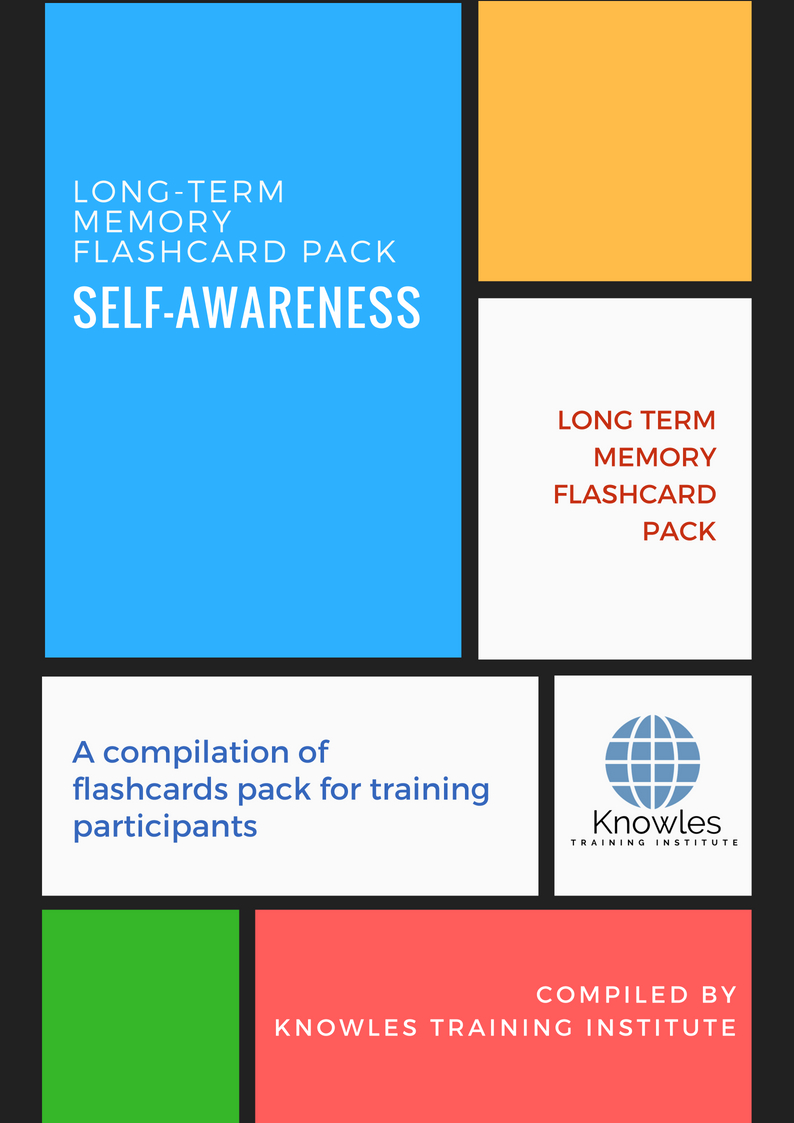
Self-Awareness Workshop E-Learning Course
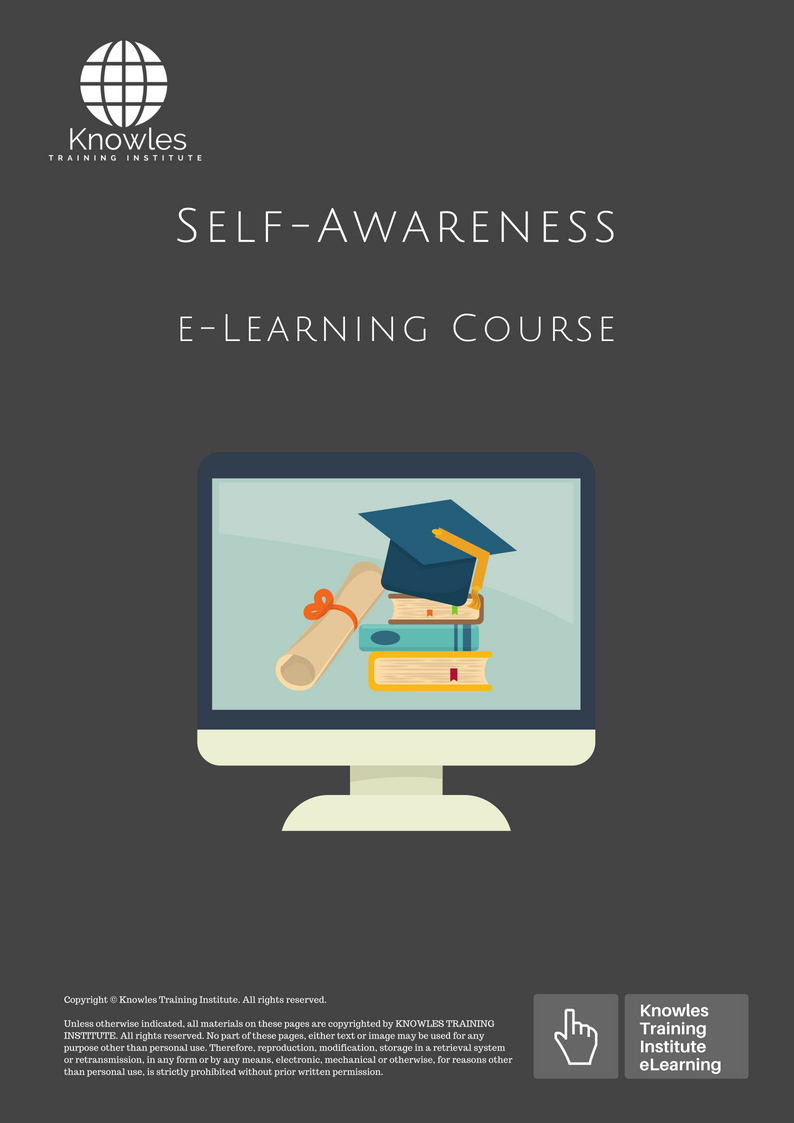
Self-Awareness Workshop Online Video Course
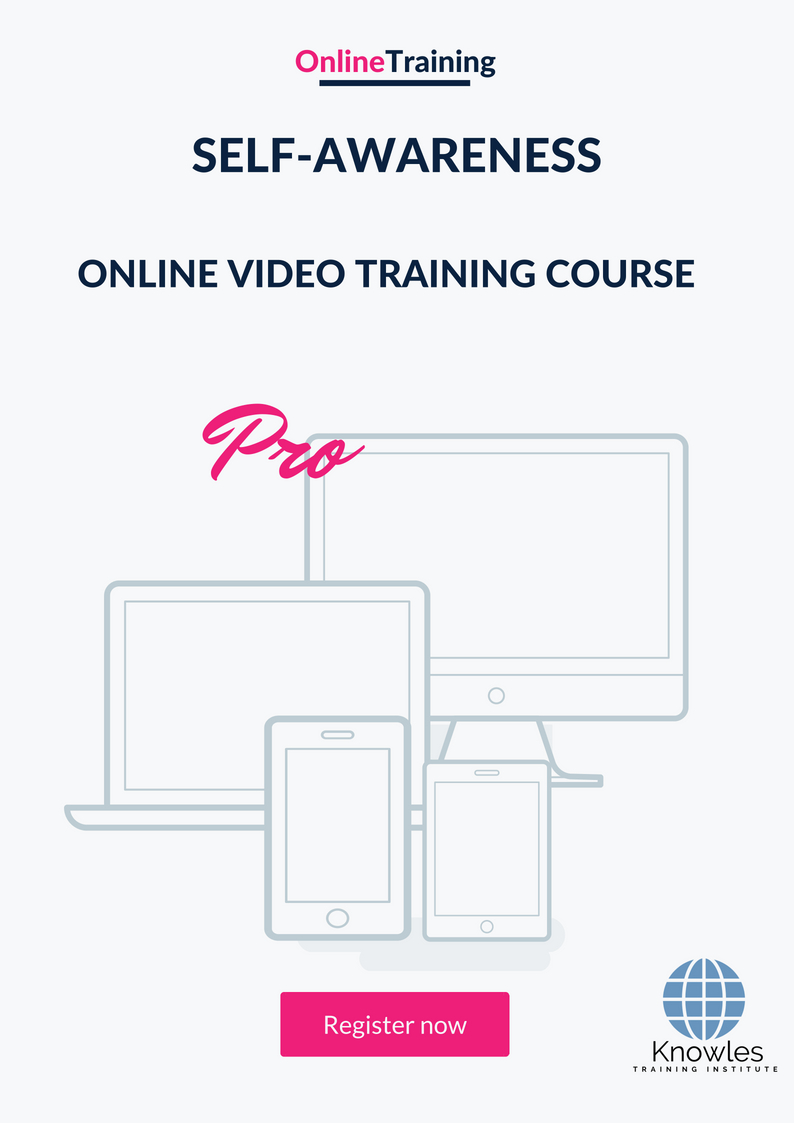
Self-Awareness Training Workshop Essentials Audiobook
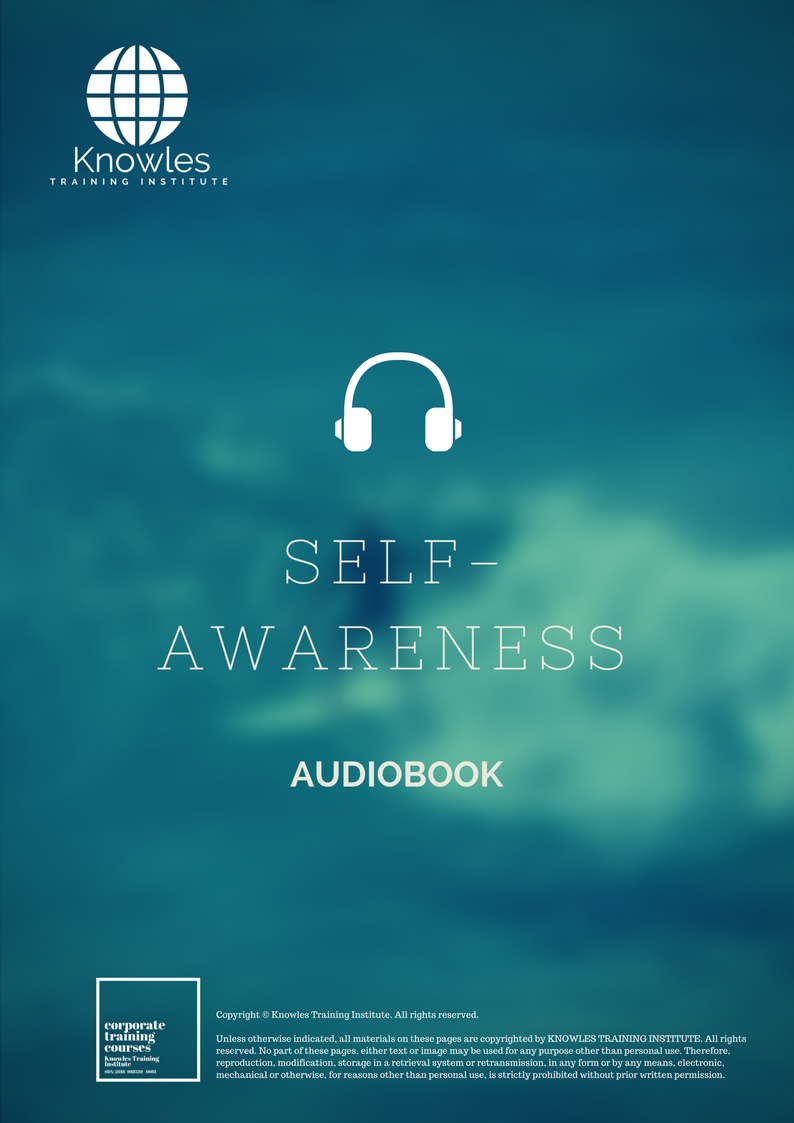
Self-Awareness Workshop Infographics Pack
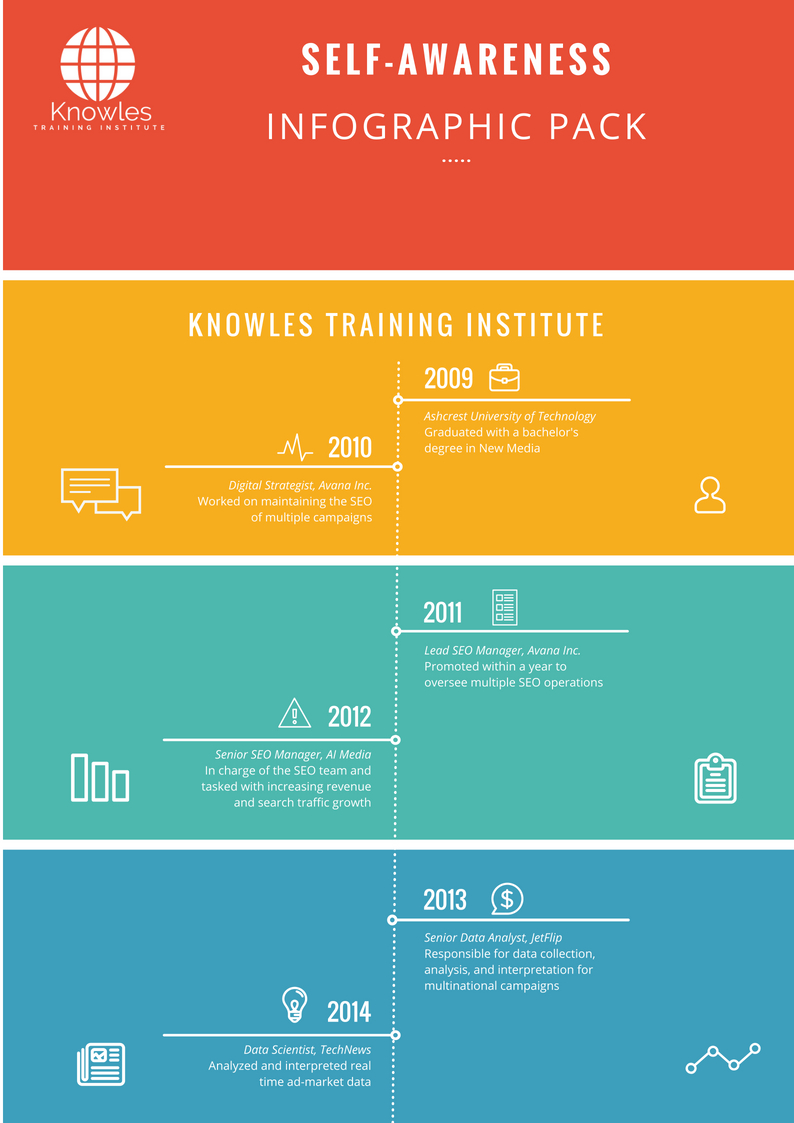
Self-Awareness Training Workshop Certification
Each course participant will receive a certification of training completion
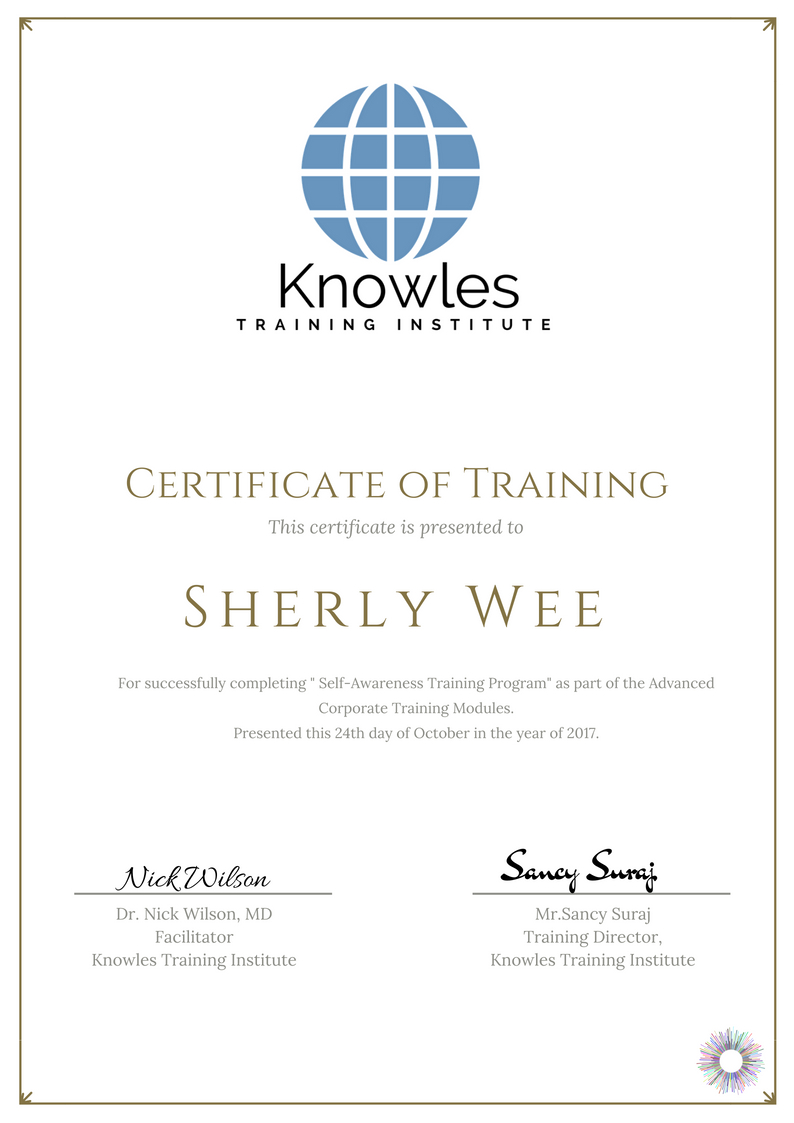
Self Awareness Training Course Fees
There are 4 pricing options available for this Self-Awareness training course. Course participants not in Singapore may choose to sign up for our online Self-Awareness training course.
- SGD 889.97 For a 60-minute Lunch Talk Session.
- SGD 389.97 For a Half Day Course Per Participant.
- SGD 589.97 For a 1 Day Course Per Participant.
- SGD 789.97 For a 2 Day Course Per Participant.
Discounts available for more than 2 participants.
Course Facilitator
Our Trainers are Subject Matter Experts.
Our subject matter experts stimulate discussions, generates ideas, foster curiosity and excitement among all of our training participants. All of our trainers have a minimum of 10-20 years in the training industry.
Upcoming Course Schedule
Contact us for the latest Self-Awareness course schedules:
Phone: +65 6714 6663
Email: contact@knowlesti.com
Message:
Download Course Brochure
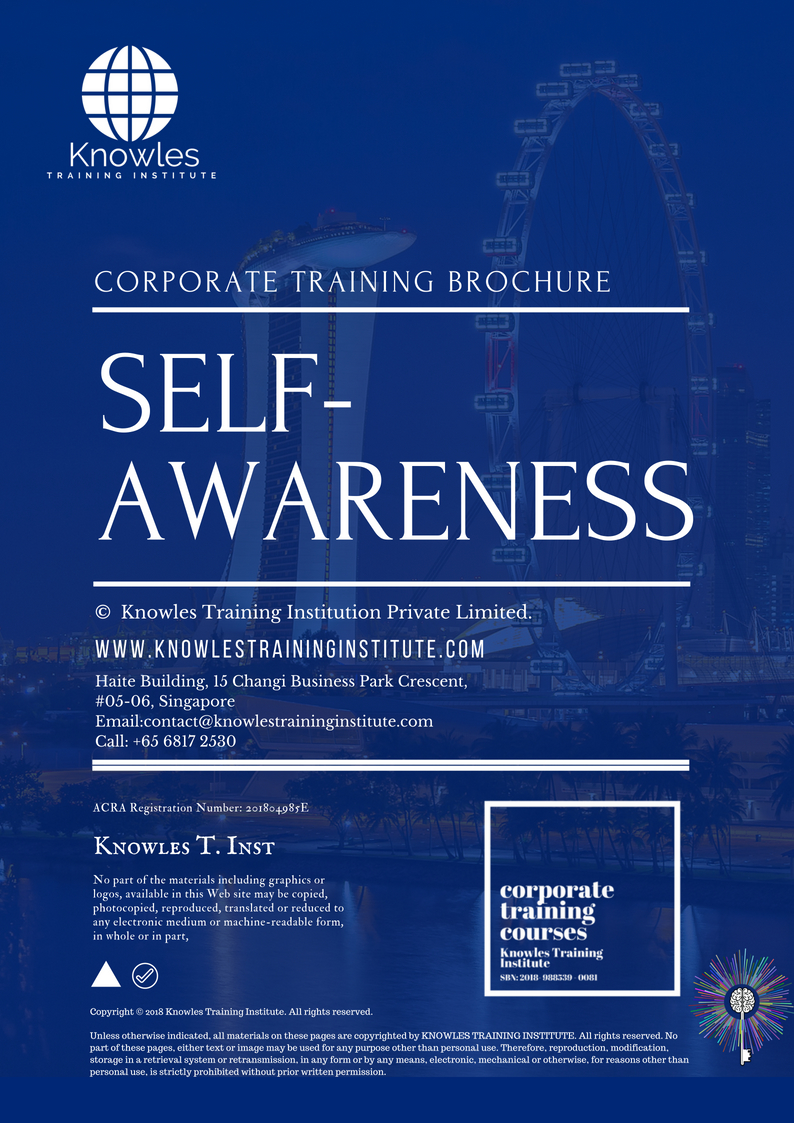
Request for this Self-Awareness course brochure. Fill up the short information below and we will send it to you right away!
Post-Training Support: A vast majority of training does not have any effect beyond 120 days. But to work, training has to have a strong pre- and post-training component. Post-training reinforcement consequently helps individuals to recall the understanding and ask questions.
Blended Learning: Learning does not occur in the classroom. Virtually everybody prefers distinct ways of learning. Successful learning should have a multi-channel, multi-modal strategy.
We Understand The Industry: Similarly, we’ve got a profound comprehension of the business, business design, challenges, strategy and the that our participants are in and have designed the courseware to cater to their professional needs.
Course Content: Knowles Training Institute’s material is relevant, of high quality and provide specific learning outputs. As a result, Participants will leave the training course feeling as they have gained a strong understanding and will also be in a position to execute what they have learned sensibly.
Course Development — The workshop modules follow a systematic and logical arrangement. Therefore, this structure helps to ensure that the course material allows the facilitators to deliver the course in a logical arrangement. Consider the subjects as building bricks into learning, our facilitators slowly build towards a comprehensive picture of this entire topic.


Course Enquiries

Fill up the form and we will get back to you in less than 1 working day.
Alternatively, give us a call to have one of our training consultants contact you. Our corporate training courses can be contextualized to meet your organization’s training needs. Leverage on our large pool of professional trainers and consultants for your organization’s training needs.
Office Address: 60 Paya Lebar Rd, #07-54 Paya Lebar Square, Singapore 409051
Office Phone: +65 6714 6663
Email: contact@knowlesti.sg
We Guarantee 100% Privacy. We Respect Your Privacy. Your Information Will Never Be Shared.
Register Now
Register For This Self-Awarness Course Now!
Self-Awareness FAQs
What does it mean to have self-awareness?
Self-awareness is the capacity to concentrate on yourself and how your actions, thoughts, or emotions do or don’t align with your internal standards. If you are highly self-aware, you can objectively evaluate yourself, regulate your emotions, align your behaviour with your values, and understand how others perceive you.
What is self-awareness, and why is self-awareness important?
Self-awareness is the fundamental cornerstone to emotional intelligence, according to Daniel Goleman. The capacity to monitor our emotions and thoughts from moment to moment is key to knowing ourselves better, being at one with who we are and proactively controlling our thoughts, emotions, and behaviours.
How do you develop self-awareness?
How to Become More Self-Aware During Your Life
- Look at yourself objectively.
- Keep a journal.
- Write down your goals, plans, and priorities.
- Perform daily self-reflection.
- Practice meditation and other mindfulness habits.
- Take personality and psychometric tests.
- Ask trusted friends to describe you.
What are the types of self-awareness?
There are two forms of self-awareness available. One is conceptual self-awareness: what we think about ourselves, which may include judgement, evaluations, logical conclusions, and things that are easy to put words to. The other is embodied self-awareness, which includes registering various types of inner states.
What is an example of self-awareness?
Self-awareness is a person’s knowledge of themselves and their worth as a person. An example of self-awareness is what someone hopes to gain through therapy. “Self-awareness.”
What are the three kinds of self-awareness?
What makes individuals self-conscious is a combination of mental, physical, and contextual factors. The three types of self-awareness are indexical, detached, and lastly social self-awareness. That is important to entertain a full range of thoughts about oneself.
What are the characteristics of self-awareness?
Daniel Goleman, the guru of emotional intelligence, distinguished self-awareness as being made up of emotional awareness, accurate self-assessment, as well as self-confidence. Self-awareness is all about understanding your emotions, your individual strengths and weaknesses, and having a strong sense of your own worth.
What causes lack of self-awareness?
Low self-awareness has not only been connected with poor leadership performance but also to bad mental well-being and self-destructive behaviours, and examples of that include addictions.
Can self-awareness really be taught?
Self-awareness is the trickiest skill to develop. It is a paradox, to become more self-aware, you have to be aware enough about yourself to know you need to know yourself thoroughly.
What are the benefits of self-awareness?
Benefits of self-awareness include:
- enriched emotional intelligence and greater empathy and listening skills;
- improved critical-thinking skills and decision making;
- strengthened communications and relationships; and.
- Enhanced leadership capabilities and capacity.
Is self-awareness a sign of intelligence?
One of the common sign of high emotional intelligence is self-awareness. Self-awareness is an extensive understanding of what makes us tick; what angers us, makes us happy, bores as well as interests us. It also means that we can evaluate ourselves, faults and all, with great honesty and clarity.


